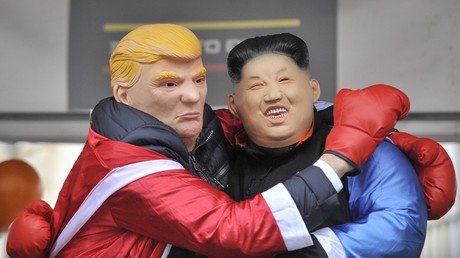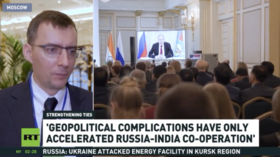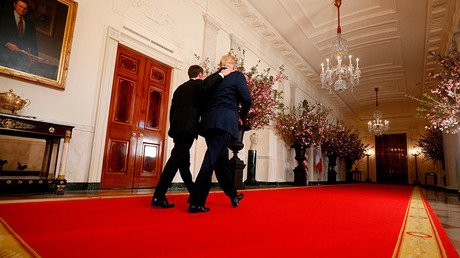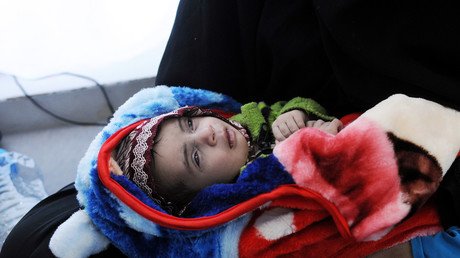Peace breaks out on the Korean peninsula despite – not because of – Washington hawks
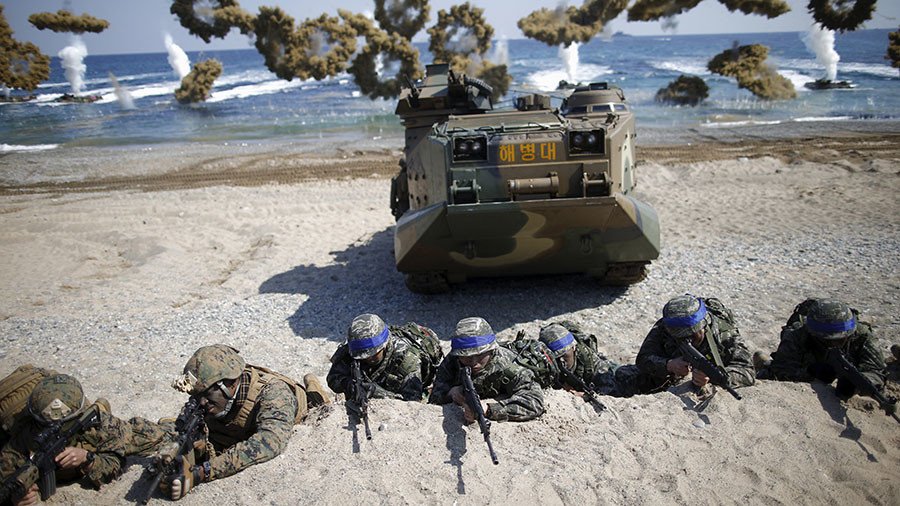
The leaders of North and South Korea stunned the world on Friday by declaring a new age of peace between their long-divided states. But to credit Washington for this remarkable turnaround would be sending a dangerous message.
To say that the situation on the Korean peninsula has been moving ahead at breakneck, roller-coaster speed would be a great understatement. Just a few months ago, the world held its breath as Pyongyang slammed yet another round of US-backed sanctions as an "act of war." In the background of the breakdown was Donald Trump, armed with an insurmountable ego and a very active Twitter account, helping to drive up tensions to the boiling point.
This week, the mood could not have been any more different had white doves and rainbow-colored unicorns descended upon the Korean peninsula from the heavens and broke out in song and dance.
Two Koreas agree:- to completely denuclearize Korean peninsula- to hold multi-party talks, involving US and China- to have high-level military talks in May- to establish 'firm peace regime'- Kim said he hopes two Koreas will reunite DETAILS: https://t.co/I0RU9xtxxBpic.twitter.com/3kcA9cTC8m
— RT (@RT_com) April 27, 2018
Few could have imagined the historic event that was playing out before them: Kim Jong-un strolled hand-in-hand with South Korean President Moon Jae-in across the forbidden Militarized Zone, thus becoming the first North Korean leader in 65 years to enter South Korean territory. But that was just the beginning of April's shower of political surprises. Kim and Moon went on to commit themselves to eliminating nuclear weapons on the peninsula, and pledging to sign a formal peace treaty later this year.
The two Koreas have essentially been at war for the last 68 years, since a formal peace treaty was never signed following the cessation of hostilities during the Korean War (1950-1953).
So, now that peace has swept the Korean peninsula, any guesses as to who may get the credit for this historic breakthrough?
Yes, you guessed right, the very same global superpower that until recently was acting like a schoolyard bully with Kim Jung-un, forcing him to choose between going head-to-head against overwhelming US military might, or battening down the hatches and getting to work building up its national defenses.
Kim Jong-un gambled with the latter approach. And it would appear that he has won. At least for now.
Nevertheless, at least one Western publication, The Telegraph, has come out and declared its support for Donald Trump as their candidate to win a Nobel Peace Prize for "defusing" the Korean crisis.
I spoke with President Moon of South Korea last night. Asked him how Rocket Man is doing. Long gas lines forming in North Korea. Too bad!
— Donald J. Trump (@realDonaldTrump) September 17, 2017
"This year's prize should go to an American leader who for once has earned it: Donald Trump," the British tabloid declared, in a thinly veiled swipe at Barack Obama, the last American to seize the tarnished trophy. "If President Trump succeeds… he will have defused the most dangerous crisis the world faces at present."
Can it really be argued that the Trump administration – which has been playing a nerve-wracking game of nuclear chicken with Pyongyang for over a year – deserves credit for detonating the Korean peninsula time bomb? Personally, I believe that historical rendering of events is not only categorically wrong, it is simply dangerous because it condones the utterly reckless behavior displayed by the Trump administration as a method for solving crisis.
Kim Jong Un of North Korea, who is obviously a madman who doesn't mind starving or killing his people, will be tested like never before!
— Donald J. Trump (@realDonaldTrump) September 22, 2017
Let's face it: nobody could have predicted what sort of response the North Korean leader – who seems every bit as egoistical and unpredictable as Donald Trump – would have made as he faced not only regular US-led naval "decapitation" drills off the coast, but the occasional verbal barrage from the US commander-in-chief. Like this beauty, for example, from the torrid month of August, 2017: "North Korea best not make any more threats to the United States… they will be met with fire and the fury like the world has never seen."
Does anyone know what this guy did to win a Nobel Peace Prize? pic.twitter.com/KUvrvcuU7w
— Redeemed Suzy (@suzydymna) April 27, 2018
North Korea may be accused of being many things, but slow to learn is not one of them. After observing what happens to countries that lack the military power to defend themselves – not least of all Iraq in 2003, followed by Libya in 2011 – Pyongyang set out to bolster its defenses without delay. And this was happening long before either Kim Jong-un or Donald Trump were rumbling on the political scene.
Since 2006, North Korea has conducted six nuclear tests, with the latest and most powerful detonation coming in September of last year. Thus, it was not the Trump administration's aggressive approach that brought Pyongyang to the negotiating table. North Korea has long been preparing for the moment when it could feel secure enough to enter negotiations from a position of strength.
That golden moment was sealed in November when Kim Jong-un's government claimed that it had launched an upscale intercontinental ballistic missile (ICBM) – a Hwasong-15 – capable of "carrying a super-heavy warhead and hitting the whole mainland of the US." That launch sent an unmistakable message to Washington, not to mention America's Pacific allies, like Seoul and Tokyo, who were growing very weary of the fireworks display.
Yet it was not Kim Jung-un who they blamed the most for the outbursts, but rather Donald Trump and his administration's reliance on a "big stick" policy. That approach had simply become untenable since the prospect of a nuclear war in the Asian Pacific had become too catastrophic to even consider.
In other words, it had become clear that the only way forward was to sit down and hammer out a deal with Pyongyang.
At this point, Kim appears satisfied that his country is capable of defending itself against any would-be aggressor that may attempt to relieve his country of its sovereignty. Far from the same tragic fate that greeted Iraq or Libya, Pyongyang is negotiating from a position of strength, as well as sovereignty.
All things considered, it seems to be a very unfortunate lesson, which places so much emphasis on military power and readiness, but it is one that the United States has forced weaker nations of the world to learn. In a hurry.
The statements, views and opinions expressed in this column are solely those of the author and do not necessarily represent those of RT.

